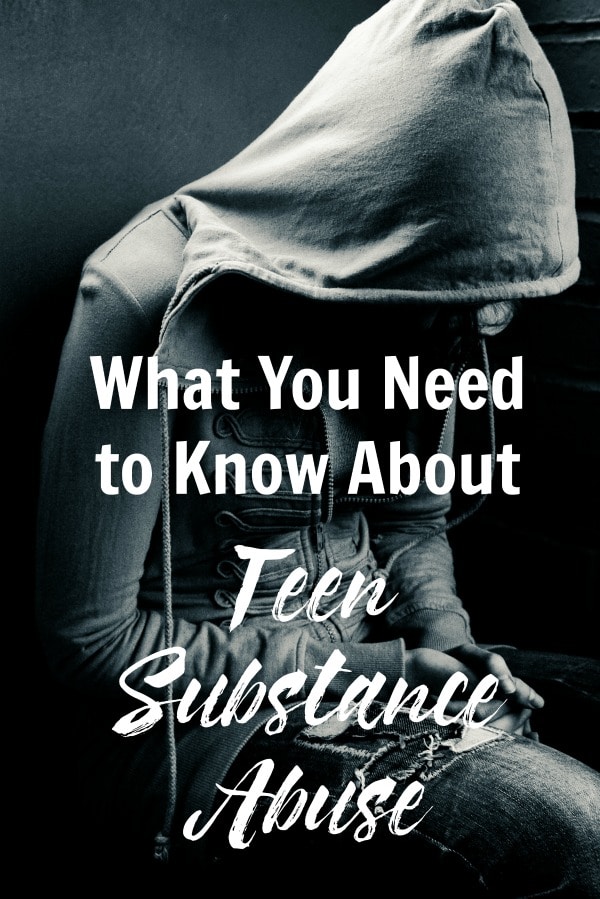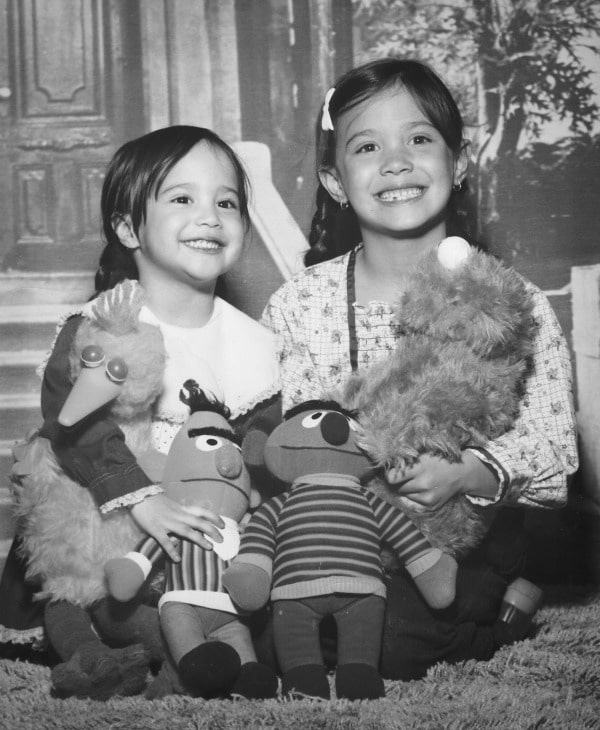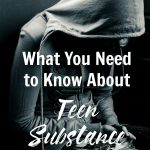This is a sponsored post written by me on behalf of National Institute on Drug Abuse for IZEA. All opinions are 100% mine.
In honor of National Drug & Alcohol Facts Week®, today I’m sharing my sister’s story of teen substance abuse. I hope that her story will help others.

My sister died as a result of a heroin addiction at the age of 26. Raised in the same middle-class home by Catholic parents, our lives took completely different paths. How did two sisters raised by the same parents end up so dramatically different?

She was the smart, strong, confident one, whereas I was the self-conscious teen who wanted people to like me. Based on what I knew about teens, peer pressure, and drug and alcohol use, I seemed the more likely candidate to be led astray.
Factors Related to My Sister’s Substance Abuse
Since my sister is no longer alive to tell her story, I’ve had to piece together what I believe are the most likely factors based on my memory and existing research. These are my own conclusions, not the diagnosis of a mental health professional.
I’m sharing these thoughts in the hope that it might help give others a perspective on teen substance abuse that inspires further reading and discussion. My only goal is to help others learn more about teen substance abuse so that we can all work to help prevent it.
Unrealistic Expectations
My grandmother came to live with us when my sister was just a baby and I had just started school. As a result, though she loved us both, she showered my sister with much more attention.

As you can see in our portrait above (can you guess the era based on our stylish fashion choices?), my sister had a special place in my grandmother’s life.
Eager to do her part to help the family, my grandmother took to doting on my sister who she viewed as fragile. My sister had a severe allergic reaction to penicillin as a baby. My grandmother went to great lengths to make her life easy and comfortable.
Though I was jealous of the extra attention and gifts my sister received when we were children, I realize now that my grandmother’s well-intentioned doting had unexpected negative consequences. When my grandmother passed away, my sister no longer had a personal fan club and maid service and the hole it left was a big one to fill.
She was used to getting whatever she wanted and being told regularly how great she was for simply existing. As a result, she had an expectation to be treated as such without doing any of the things the rest of us associate with those outcomes – working hard, being kind to others, planning, saving, contributing to the greater good.
Do I think that showering your kids with love and gifts leads to substance abuse? Not necessarily. But in my sister’s case, I think it was a contributing factor. When she was no longer being doted on, she had to find a new way to feel good and she opted for an easy, but for her, fatal alternative.
Lack of Perseverance
Because my grandmother did a lot for my sister, she didn’t have to exert much effort to get what she wanted. As a result, when she wanted things my grandmother couldn’t do for her, she often gave up.
For example, she wanted to play the violin. When she didn’t progress fast enough in her opinion, she gave it up altogether. When she joined a sport, and wasn’t the star player, she quit in the middle of the season.
In short, she lacked perseverance. She had no will to stick with something to the end. I believe this contributed to her inability to recover from her addiction. And ultimately, it’s why I believe she opted to commit suicide instead of going through the very painful process of fighting addiction. However, it’s important to remember that although drug addiction is a disease, it is treatable.
This correlation is part of the reason why I do not allow my kids to quit activities they don’t enjoy.
If they sign up for a sport, they must finish the season. If they sign up for music lessons, we agree at the start how long they will give it to see if they want to continue. They can’t quit beforehand.
Peers
As I mentioned before, I was a prime candidate for caving to peer pressure. Fortunately for me, my friends were all kind, motivated individuals. They pressured me to get good grades and be active in school clubs and sports.
My sister’s peer group was different. Though they were very friendly, their interests lay outside of school.
My sister and I were four years apart so I was in college when she started high school. Even from a distance though, I could see the difference.
Though she was very bright, her grades were average. She wasn’t involved in any school sports or activities, yet she was never home. Details about where she was, who she was with, and what she was doing were always vague.
I don’t think the kids she hung out with were bad. I think the lack of parental supervision and involvement led to them doing some irresponsible things.
As a parent, I try to avoid this with my own kids by making our home a welcome environment for them to hang out with their friends. I’ll happily feed a dozen teens to get the chance to know them and to give them a safe place to hang out and enjoy each other’s company.
Cigarettes
I know it seems like a slippery slope to suggest that smoking leads to heroin use, and I don’t think that’s true for most people. However, in my sister’s case, I believe smoking was the first step in her progressive drug use.
She started “sneak” smoking. She never smoked at home but would smell like cigarettes and say that it was from others smoking wherever she’d been. However, when she visited me at college, she smoked openly.
I didn’t know until later (when we found her photo albums after her death), but she was drinking and smoking marijuana with her friends too. There were dozens of pictures in her photo album of her as a high schooler with a beer can or joint in her hand.
As long as you’re smoking against your parents’ wishes, why bother following any rules? And plenty of people drink, right? And pot really isn’t any worse than alcohol, is it? These are the thoughts I imagine occurred to her.
Sometime after high school, she told me her boyfriend introduced her to ecstasy. Maybe she would have been just as likely to try it if she hadn’t already stepped over the line to illegal drugs, but I think the odds would have been lower.
From ecstasy, she escalated very quickly to heroin. As she explained to me much later, once you start buying drugs from a dealer, they work pretty hard to make sure you’re a repeat customer.
So, it may be a slippery slope, but it’s one I don’t want my kids on. From an early age, I’ve talked to them about the harmful effects of smoking, alcohol and drug use.
Learn More About Teen Substance Abuse
I’m not an expert. I’m just a sister in mourning. I can’t bring my sister back, but I hope that by evaluating what led to it, I can help my children and others find a better path.
National Drug & Alcohol IQ Challenge
If you’d like to learn more, I highly recommend starting with the National Institute on Drug Abuse (NIDA) website. You can take the National Drug & Alcohol IQ Challenge to test your knowledge on this topic.
To emphasize the point that I’m NOT an expert, I only got 9 of the 12 questions correct. I was woefully ignorant of the current statistics on teen substance abuse (in some cases, in a favorable way).
It’s a short quiz (just 12 questions) and it’s the perfect springboard to having a conversation with your kids. You might be surprised which of you gets the higher score!
The real value will come from talking about the questions each of you get wrong. It’s a great opportunity to speak candidly about your perceptions, assumptions, and opinions about drug and alcohol use.
Positive Parenting Resource
And if, like me, you’re a concerned parent who wants to be proactive in keeping your kids drug-free, make sure you check out the NIDA “Family Checkup.” It’s full of research-based guidance on parenting skills that prevent drug abuse.
The Family Checkup isn’t just a bunch of reading material. You’ll find realistic examples of parenting situations showing BOTH negative and positive parenting skills (via videos). This is such a great resource!
More Resources
Here are several other reliable resources to learn more about drugs and alcohol and how to help protect your kids.
- Drugs: Shatter the Myths booklet
- What to do if your teen has a problem with drugs
- Marijuana: Facts Parents Need to Know
About National Drug & Alcohol Facts Week®
National Drug & Alcohol Facts Week®(NDAFW) is an annual, week-long observance in January that aims to shatter myths about substance use and addiction. Teens are subjected to a lot of myths about drugs and alcohol from the internet, TV, movies, music and their friends. During NDAFW, the goal is to replace those myths with drug and alcohol facts.
NDAFW is sponsored by the National Institute on Drug Abuse (NIDA) and the National Institute on Alcohol Abuse and Alcoholism (NIAAA), both part of the National Institutes of Health.




It took a lot of courage to write this. Thank you.
Hi Corinne, thank you for bravely sharing your story. Stories are the best form of teaching because they are real and come from the heart. I will not forget your story. I tell my teenagers often that just one try of a drug could change them forever. My two are four years apart and very different from one another. The older a high achiever and the younger recently diagnosed with learning disabilities but both aspiring athletes. I think faith in a higher power and a gritty constitution cannot be underestimated. It’s a scary world we live in and we must take care of each other.
Corinne, I am so sorry for the loss of your sister. Substance abuse runs in my family so I understand the pain and the bewilderment of how could this have happened. Having watched substance abuse develop in my family and having worked with at-risk populations, I deeply believe that education is a critical factor in prevention. Thank you so much for sharing your story and this critical information.
Thank you for sharing your sister/family story. I am sorry for the pain you and your family have been through. I to hope your store helps at least one.